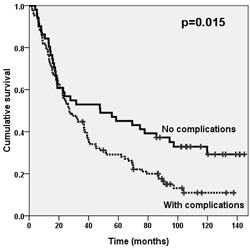
|
 |
Back to 2014 Annual Meeting Posters
The Post-Esophagectomy Complications Influence the Overall Survival but Not Disease Free Survival in Patients With Esophageal Cancer
MIN-Shiau Hsieh1,2, Yung-Han Sun1,3, Chih-Cheng Hsieh*1,4
1Division of Thoracic Surgery, Taipei Veterans General Hospital, Taipei, Taiwan; 2Department of Surgery, National Yang-Ming University Hospital, Ilan, Taiwan; 3Graduate Institute of Business and Management, Chang Gung University, Taoyuan, Taiwan; 4Institute of clinical medicine, National Yang-Ming University, Taipei, Taiwan
Backgrounds: Esophageal cancer is an aggressive malignant disease and surgical resection is still the main treatment. Due to the extensive and complex operation, the complication rate is high. However, it is still conflicting issue that post-operative complications affect the oncologic outcome and overall survival. The aim of this study is to investigate the relationship between the presence of complication and survival.
Patients and Methods: Between 2001 and 2006, 161 patients who received esophagectomy for esophageal cancer with curative intent were included. The medical records of these patients were systematically reviewed and the complications were recorded. Tumor staging was classified according to the 7th edition of AJCC cancer staging system. The Kaplan-Meier method and the log rank test were used to calculate and compare the overall survival. The Cox proportional hazards were employed to identify independent prognostic factors.
Results: There were 147 males and 14 females with a mean age of 60.9 years (range 36-88 years). Most patients (125/161, 77.6%) received transthoracic esophagectomy with gastric tubes reconstruction via retrosternal route. Complete resection was achieved in 145 (90.1%) patients, and the average resected lymph nodes were 23.6. Post-operative complications were noted in 110 patients (68.3%) including 5 surgical mortalities. The median follow-up time was 27.7 months (IQR: 13.3-78.5 months). There were 85 patients with tumor recurrence or metastasis, most of recurrence or metastasis developed within 2 years (63/85, 74.1%). The 3-year and 5-year disease-free survival (DFS) rate were 50% and 44.5%, respectively. Univariate analysis showed that gender, pathological T, N status and stage were the prognostic factors for DFS. There was no survival difference in patients with or without complications (p=0.337). Multivariate analysis showed that pathological N status (p<0.001, 95% CI, 1.333-2.238) and gender (p=0.023, 95% CI, 0.083-0.831) were the independent prognostic factors for DFS. However, the 3-year and 5-year overall survival rate were 47.4% and 34.4%, respectively. In univariate analysis showed that gender, pathological T, N status, stage and presence of complication (p=0.015, Figure 1) were prognostic factors for overall survival. Multivariate analysis showed that gender, age, pathological T, N status and presence of complication were independent factors for overall survival (Table 1).
Conclusions: In this study, we demonstrated that the post-operative complications did not affect the disease-free survival, but the presence of complications may damage other organs then influence overall survival. On the other hand, if minimal invasive approach could decrease some kinds of complications, it may improve the overall survival rate in patients received esophagectomy. Table 1. Multivariate analysis of prognostic factors influencing overall survival after esophagectomy | Variable | Relative Risk (95% CI) | p value | | Age | | 1.018 (1.002-1.033) | 0.026 | | Gender | Male | 1 | 0.046 | | Female | 0.431 (0.189-0.986) | | | T status | T1 | 1 | | | T2 | 1.245 (0.699-2.219) | 0.457 | | T3 | 1.532 (0.917-2.559) | 0.103 | | T4 | 3.932 (1.543-10.021) | 0.004 | | N status | N0 | 1 | | | N1 | 1.401 (0.912-2.150) | 0.123 | | N2 | 2.950 (1.671-5.206) | <0.001 | | N3 | 4.608 (1.962-10.822) | <0.001 | | Complications | No | 1 | 0.025 | | Yes | 1.597 (1.060-2.407) | |

Back to 2014 Annual Meeting Posters
|


